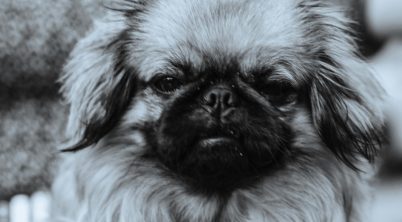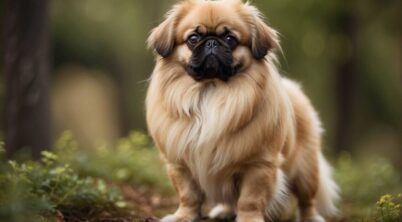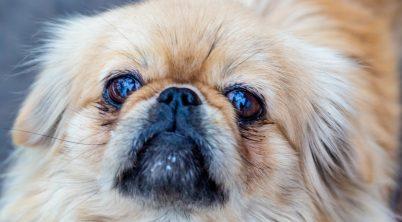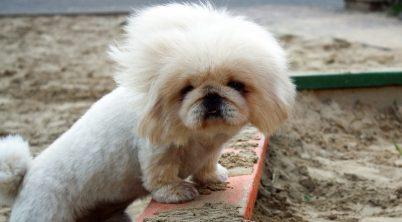The Pekingese is a distinguished toy breed known for its regal demeanor and distinctive, lion-like appearance. In considering the health and well-being of these dogs, their weight is a crucial factor that pet owners should monitor throughout the Pekingese dog’s life. The weight of a Pekingese varies with age, and knowing the appropriate size for each stage of development is essential for maintaining a healthy lifestyle for these canine companions.

A Pekingese typically weighs between 6 and 14 pounds and stands about 6 to 9 inches tall. As puppies, Pekingese should follow a steady growth curve, and their weight gain should be consistent and proportional to their age. Proper nutrition, regular exercise, and routine veterinary check-ups are fundamental in ensuring that a Pekingese is on track with their weight from the newborn stage through adulthood. While individual sizes can vary, breed standards provide a framework for what is typical within the breed.
Various factors, including diet, genetics, and overall health, influence the growth rate of Pekingese. It is common for them to reach physical maturity between 9 to 12 months of age; however, some may continue to fill out in size past this range. Responsible breeders and veterinarians can offer guidance tailored to an individual dog, ensuring that Pekingese maintain a healthy weight that’s well-suited to their size and age.
Pekingese Growth and Weight Norms
Understanding the growth and weight norms for Pekingese is essential for ensuring they develop healthily. Monitoring their weight from the puppy phase through to adulthood can significantly impact their overall health and well-being.
Weight by Age for Puppies
Pekingese puppies experience rapid growth until they reach about nine months of age. The following table outlines a typical weight range by age for Pekingese puppies:
| Age | Weight Range |
|---|---|
| Birth | 2.5 – 5.5 ounces |
| 1 month | 1.5 – 3 pounds |
| 3 months | 3 – 6 pounds |
| 6 months | 6 – 9 pounds |
| 9 to 12 months | 7 – 14 pounds (Adult) |
These figures are averages, so it’s important to remember that individual growth can vary depending on the factors discussed below.
Adult Pekingese Weight Maintenance
Once Pekingese reach adulthood, their weight should stabilize, typically ranging between 7 and 14 pounds. Maintenance of this normal weight range is crucial; a diet balanced in nutrition and routine exercise helps prevent obesity, a common issue with this breed given their stocky build.
Factors Influencing Weight
Several factors can influence the weight and growth rate of a Pekingese, including:
- Genetics: Determines potential size and growth limitations.
- Diet: Quality of puppy food and adult dog food will influence growth and development.
- Exercise: Adequate exercise is important for muscular development and preventing obesity.
- Health: Underlying health issues can impact both weight gain and loss.
Gender also plays a role; generally, male Pekingese tend to be slightly larger than females.
Health Implications of Improper Weight
A Pekingese’s weight significantly affects their health. Being brachycephalic, they already have predispositions to health issues such as snoring and brachycephalic obstructive airway syndrome. Obesity can exacerbate these issues, put extra strain on joints and bones, and potentially lead to a reduced life span. A regular check-up with a veterinarian can help detect and prevent potential health problems related to weight.
Caring for Your Pekingese
When it comes to caring for a Pekingese, understanding their unique health and lifestyle requirements is essential. Pekingese dogs are known for their long, beautiful coats which require regular grooming to maintain. At a minimum, they should be brushed several times a week to prevent matting and to control shedding. Regular dental care, including teeth brushing and professional cleanings, can prevent common issues like periodontal disease.
Being a brachycephalic breed, Pekingese have flat faces which can cause Brachycephalic Obstructive Airway Syndrome (BOAS), leading to breathing difficulties, snoring, and overheating. Owners must be vigilant during exercise to ensure their Peke does not become overexerted. Moderate exercise, such as daily walks, is recommended.
Diet and Nutrition
- Puppy Food: High-quality food specifically designed for puppies will support their growth.
- Adult Diet: Should be well-balanced to maintain a healthy weight.
- Obesity Prevention: Careful monitoring of diet to prevent weight gain is crucial, as they are prone to obesity, which can strain their joints.
Socialization and Training
Pekingese are intelligent, independent, and may display a dignified temperament. Early socialization and consistent training are key to managing their strong personalities. They bond well with older children who respect their boundaries and can be trained to minimize excessive barking.
Health Care
Routine visits to the veterinarian for vaccinations and check-ups can catch Pekingese health problems early. Pekingese may require special attention due to their muscular, stocky build, and potential joint issues as they age.
| Age | Exercise Recommendation |
|---|---|
| Puppies | Short walks; play periods |
| Adults | Up to 1 hour per day |
It’s important to tailor the Pekingese’s care regimen from puppyhood through adulthood, adapting to their changing health and lifestyle needs. Their loyal and affectionate nature makes the Pekingese a cherished companion that thrives with proper care.








